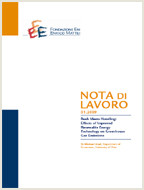Does Corporate Social Responsibility Affect the Performance of Firms?

10.07.2012
Nicola Comincioli, Laura Poddi, Sergio Vergalli
M14, C23, O10
Corporate Social Responsibility, Growth
Economy and Society
Giuseppe Sammarco
Over the last two decades in OECD countries an increasing number of firms are obtaining certification as Socially Responsible (CSR is the acronym for Corporate Social Responsibility). Several studies (including Preston and O’Bannon, 1997; Waddock and Graves, 1997; McWilliams and Sieger, 2001; Ullman, 1985) have sought to test whether there is a relation between Social Responsibility certification and firm performance. Our work builds a CSR index that intersects two of the three main international indices (Domini 400 Social Index, Dow Jones Sustainability World Index, FTSE4Good Index), in order to overcome some problems related to the multiplicity of CSR definitions and certifications. By using this database in a panel framework, our work shows that some performance indicators are affected by a firm’s social responsible behaviour and certifications. The main results seem to support the idea that CSR firms, which are more virtuous, have better long-run performance: even if they have initial costs due to the certification, they achieve higher sales volumes and profits, thanks to the reputation effect, a reduction in long-run costs and increased social responsible demand.
